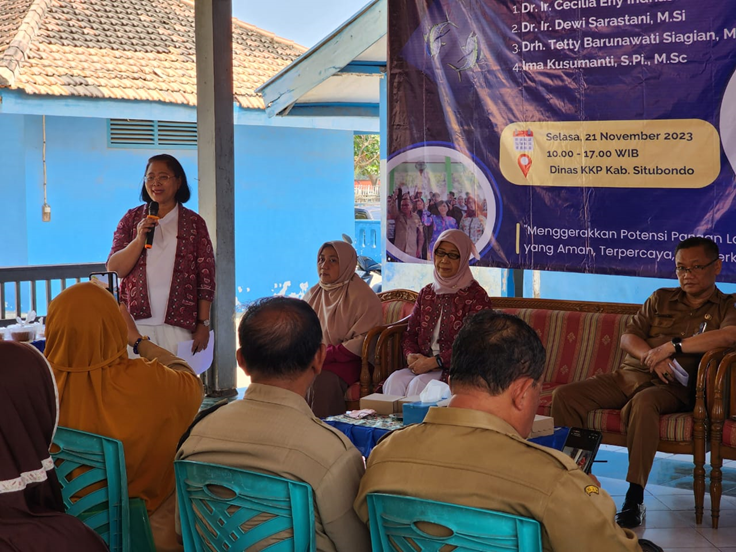IPB University Vocational School Lecturer Provided Training on Improving the Quality of Fish Petis

IPB University Vocational School lecturers carry out the Lecturer Service for Innovation program in Panarukan District, Situbondo, East Java. The activity was attended by micro, small and medium enterprises (MSMEs) petis producers throughout Panarukan District.
The program consists of improving the quality and safety of fish containers through data collection, education and assistance in implementing good processed food production methods (CPPOB).
The chair of the service team, Dr C Eny Indriastuti, said that the management of fish paste must be in accordance with food standards, so that quality, cleanliness and safety are maintained.
“This can also provide an opportunity for petis products to be marketed outside the region,” explained the lecturer at the Fish Hatchery Technology and Management Study Program at IPB University Vocational School.
Apart from Dr Eny, the resource persons for this activity also came from across study programs, namely Ima Kusumanti, SPi, MSc (Fish Hatchery Technology and Management), Dr Dewi Sarastani (Food Quality Assurance Supervisor) and Drh Tetty Barunawati Siagian, MSi (Veterinary Paramedic).
“It is hoped that this activity will not only provide socialization regarding the assistance plans that will be carried out, but also until they have a halal certificate institution and better packaging. “It is hoped that this will have an impact on wider product marketing outside Situbondo Regency,” said Dr Eny.
In her material, she explained the implementation of CPPOB starting from the production environment, buildings and household industrial facilities (IRT), production equipment, water supply, hygiene-sanitation facilities and activities, maintenance and programs, to employee training.
Meanwhile, Dr Dewi provided an understanding of home industry food industry licensing certification (IRTP), in this case the provision of P-IRT numbers and procedures for inspecting home industry food production facilities.
The importance of implementing the pre-requisite program (PRP) was also conveyed by Ima Kusumanti. PRP is a procedural action that reduces the likelihood (likelihood) of a food safety hazard or food quality hazard occurring, but may not be directly related to activities that occur during production.
Meanwhile, Dr Tetty discussed pest control in fish paste MSME activities. This is considered important so that the quality and safety of the products produced is maintained. Examples of pest control include controlling insects, storing raw materials, and using pesticides.
In implementing this program assistance, participants are very enthusiastic and hope for local government support in supporting fish container safety through data collection, education and assistance in implementing CPPOB. (*/Rz) (IAAS/YMK)



